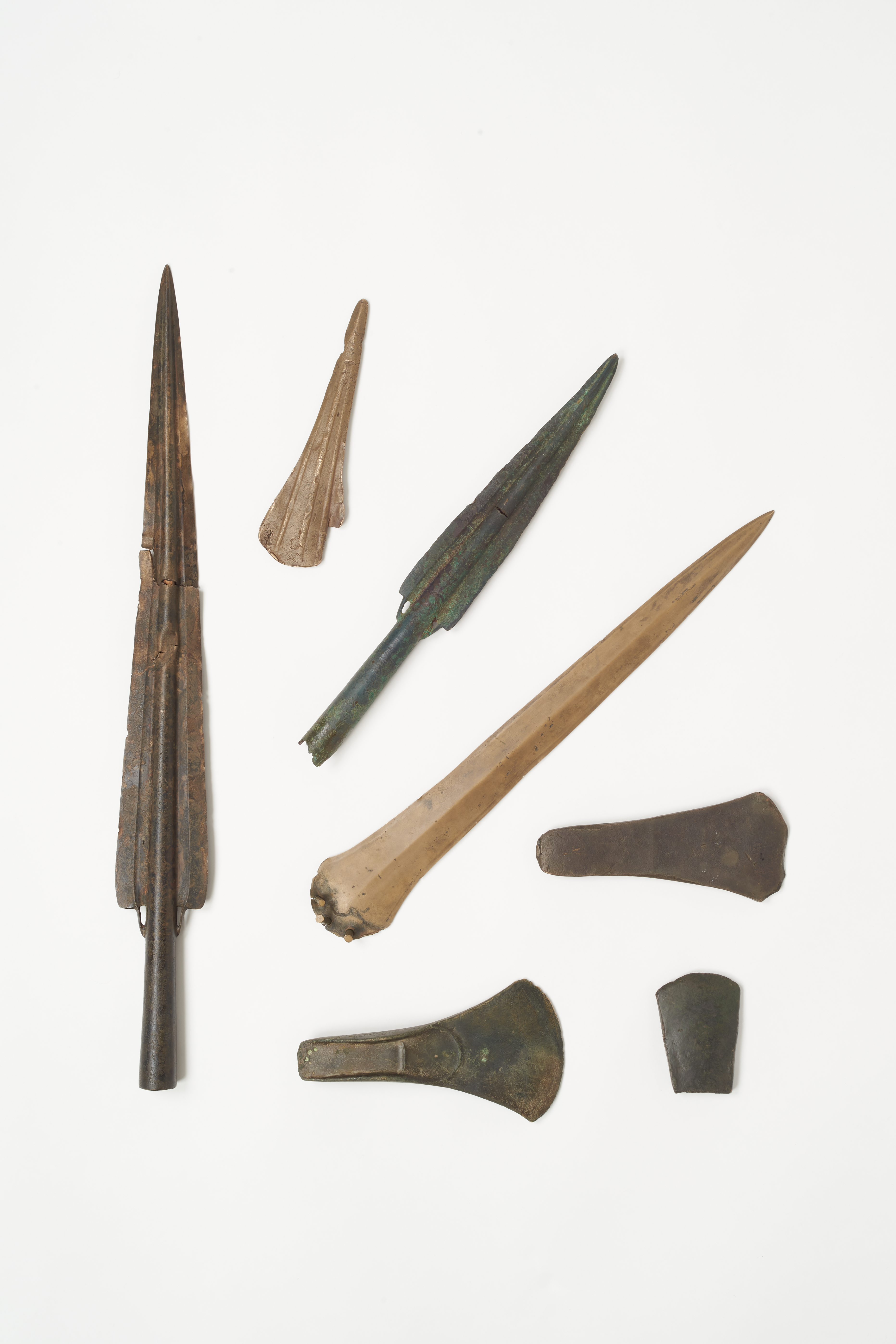Wednesday, 17 July 2024
Fascinating Bronze Age finds, found in the wetlands of the River Trent, will be on display in a brand-new free exhibition at the University of Nottingham Museum.
The exhibition Bronze Age Offerings in the River Trent, which opens on 19 July 2024, brings together items from the University Museum, Nottingham City Museums and Galleries and Derby Museums to throw light on the Bronze Age of the East Midlands.
Around 3,000 years ago, rich warriors made offerings in the River Trent, and about 200 of these artefacts have been recovered from the waters of the river and the surrounding wetlands, making it one of the biggest such collections in Europe.
55 of these bronze objects, including spectacular Bronze Age swords and spears, have been brought together by the curators Mark Pearce, Professor of Mediterranean Prehistory, and Dr Richard Davis, Honorary Research Fellow in the Department of Classics and Archaeology.
Professor Pearce, who has been studying the ritual deposition of Bronze Age metalwork recovered from the River Trent and its floodplains, said:
“This exhibition throws light on the beliefs of the inhabitants of the East Midlands 3,000 years ago, who made rich offerings to the gods in the waters of the River Trent. The swords and spears offered in the river were the prized possessions of Bronze Age warriors and chieftains.”
Everyday life and religion were closely bound together in the Bronze Age. Weapons were also symbols of status and power and were part of the way rulers presented themselves. Prestigious items of prehistoric metalwork, such as the swords and spearheads, affirmed people’s position in society and so not only tell us about hunting and combat, but they also reveal people’s social status.
 Bronze Age artefacts in the University of Nottingham Museum
Bronze Age artefacts in the University of Nottingham Museum
It’s known that Bronze Age Britons deposited thousands of prehistoric objects in particular rivers as gifts to the deities. The River Trent is one of the principal rivers in Europe – along with the Thames, the Seine and the Rhine – where prehistoric metalwork was ritually deposited in the water at various points along its length. Not only do these items tell us about society at the time, but they also tell us about beliefs and spirituality during the Bronze Age in the East Midlands.
Dr Clare Pickersgill, Keeper of the University of Nottingham Museum, said: “This exhibition is a wonderful opportunity to bring these artefacts together, for the first time, and to discover what they can tell us about the region during this fascinating period of time. We look forward to welcoming visitors to the exhibition.”
The exhibition runs from Friday 19 July 2024 to Sunday 5 January 2025 at the University of Nottingham Museum and admission is free. Opening times, 12 noon-4pm Thursday to Sunday. Closed Monday to Wednesday. There will also be a programme of events around the exhibition, including a free family half-term event where visitors can join for Bronze Age clay and craft activities and learn about ancient craft on Saturday 19 October. Find out about these upcoming events at Lakeside Arts.
Story credits
More information is available from Professor Mark Pearce via mark.pearce@nottingham.ac.uk
Notes to editors:
About the University of Nottingham
Ranked 24 in Europe and 15th in the UK by the QS World University Rankings: Europe 2024, the University of Nottingham is a founding member of Russell Group of research-intensive universities. Studying at the University of Nottingham is a life-changing experience, and we pride ourselves on unlocking the potential of our students. We have a pioneering spirit, expressed in the vision of our founder Sir Jesse Boot, which has seen us lead the way in establishing campuses in China and Malaysia - part of a globally connected network of education, research and industrial engagement.
Nottingham was crowned Sports University of the Year by The Times and Sunday Times Good University Guide 2024 – the third time it has been given the honour since 2018 – and by the Daily Mail University Guide 2024.
The university is among the best universities in the UK for the strength of our research, positioned seventh for research power in the UK according to REF 2021. The birthplace of discoveries such as MRI and ibuprofen, our innovations transform lives and tackle global problems such as sustainable food supplies, ending modern slavery, developing greener transport, and reducing reliance on fossil fuels.
The university is a major employer and industry partner - locally and globally - and our graduates are the third most targeted by the UK's top employers, according to The Graduate Market in 2024 report by High Fliers Research.
We lead the Universities for Nottingham initiative, in partnership with Nottingham Trent University, a pioneering collaboration between the city’s two world-class institutions to improve levels of prosperity, opportunity, sustainability, health and wellbeing for residents in the city and region we are proud to call home.
More news…